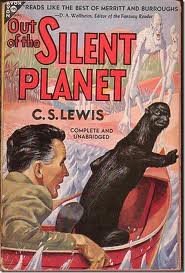
D.A. Carson on Systematic and Biblical Theology

Here is a link to D.A. Carson's essay on Systematic and Biblical Theology.
- Details
- Category: Recommended Reading Recommended Reading
- Published: 27 August 2012 27 August 2012
- Hits: 3102 3102
Scobie on the History of Biblical Theology
Here is the article by Scobie on the history of Biblical Theology. Enjoy!
- Details
- Category: Recommended Reading Recommended Reading
- Published: 24 August 2012 24 August 2012
- Hits: 3047 3047
Thomas Aquinas on Wisdom

Here is a good, short piece on Thomas Aquinas on wisdom. Enjoy! On the question of a Christian approach to wisdom and to the life of the mind, my preference is for Augustine, and I try to flesh this out in a bit in my book, The Gospel and the Mind: Recovering and Shaping the Intellectual Life. But nonetheles, Thomas always repays the attention given him.
- Details
- Category: Recommended Reading Recommended Reading
- Published: 17 July 2012 17 July 2012
- Hits: 4286 4286
C.S. Lewis and Out of the Silent Planet

As a young man I fell in love with the work of C.S. Lewis, and I have never been the same. While I loved his Chronicles of Narnia, I also love his science fiction trilogy: Out of the Silent Planet, Perelandra, and That Hideous Strength. A good friend and I recently read the first of the trilogy, Out of the Silent Planet. While the third in the trilogy, That Hideous Strength, is my favorite, I enjoyed re-reading the first volume.
One of Lewis' most helpful insights is what he has to say about fear. In the novel, a character is summarizing one of the problems of the human race. One of the key issues is fear.
A central character says to Weston (a villain in the story): “When first you came here, I sent for you, meaning you nothing but honour. The darkness in your own mind filled you with fear. Because you thought I meant evil to you, you went as a beast goes against a beast of some other kind, and snared this Ransom” (Ransom is the chief protagonist/hero in the story) (p. 134).
Oyarsa, a leader of an alien planet (I don’t want to give too much away, if you have not read the story!) confronts the evil Weston (the villain from earth): “Yes . . . but one thing we left behind us . . . fear. And with fear, murder and rebellion. The weakest of my people does not fear death. It is the Bent One, the lord of your world [i.e., earth], who wastes your lives and befouls them with flying from what you know will overtake you in the end. If you were subjects of Maleldil you would have peace” (p. 140).
I am currently writing a book on the nature of works, obedience, and faithfulness in the Christian life. This entails that one tries to make sense of why one obeys the Lord, and why one does not. I have been helped over the years by the work of Scott J. Hafemann. One of the things I have learned from Scott (although the insight is not unique to him) is the relationship between unbelief and disobedience (and the relationship between belief and obedience ).
As Hafemann has suggested, we obey the Lord because we trust Him. Indeed, as Hafemann sees it, our obedience is really simply trust in action. That is, our obedience is a form of trust. If this is the case—and I believe Hafemann is right here—then we would be led to say something fairly radical: when we disobey the Lord, in the moment of our disobedience we are—in a sense—practicing unbelief in that moment. That is, if we disobey the Lord we are in fact—when we disobey—saying, “I don’t really believe Lord that You are providing for me, and that the best thing for me to do is to obey you in this instance. At least at this moment I am not so sure that I can trust you to best provide for my needs, and to be the ultimate source of my greatest joy and satisfaction. So, at least at this moment I am going to try another path.” In sum: disobedience is evidence of a type of “temporary” unbelief.
When I re-read Out of the Silent Planet, I thought of Hafemann’s work on the nature of belief/obedience, and unbelief/disobedience. For Lewis seems to be saying that so much of the tragedy and wickedness and sinfulness we see around is rooted in fear. And one way of coming to terms with fear is to realize that it is simply one way in which unbelief manifests itself. For the Christian, fear can never be the final or ultimate way of life. Suffering is real, and tragedy is real, and need not be minimized. But fear is not the final word. If we truly trust the Living God, and believe in the resurrection, we know that death has been defeated, and that God—one day—will make all things right. We should trust that the God of Scripture will do right, and not fear for our future. Fear, it would seem, is simply one more way in which unbelief manifests itself. Ultimately, fear is not an option.
- Details
- Category: Recommended Reading Recommended Reading
- Published: 25 May 2012 25 May 2012
- Hits: 6567 6567
Richard Weaver and Modern Warfare

I am happy to recommend a new essay by my friend Jay Langdale, which can be found at the website of the online journal, Anamnesis. Langdale's essay is titled "“One more chance for the conservative solution”: Richard Weaver’s Traditionalist Conservative Critique of Modern Warfare."
One of the most seminal books in my own intellectual development is Richard Weaver's Ideas Have Consequences. Not as well-known, but perhaps equally helpful to me is his Visions of Order: The Cultural Crisis of Our Time. I am always struck by how many persons will point to Ideas Have Consequences as the book that really made them begin to think. I know it was a game-changer in my own development. If you read either of these books and find yourself wanting to read more, I would recommend a collection of his essays: Defense of Tradition: Collected Shorter Essays of Richard M. Weaver, 1929-1963.
I am convinced that until contemporary conservative thought can reclaim the kind of tradition represented by folks like Richard Weaver, contemporary conservativism will be virtually meaningless and impotent. My own attempt to wrestle with the relationship between Weaver and the Christian faith can be found in my essay, "Richard Weaver, the Gospel, and the Restoration of Culture," which was published in Thriving in Babylon: Essays in Honor of A.J. Conyers.
- Details
- Category: Recommended Reading Recommended Reading
- Published: 11 May 2012 11 May 2012
- Hits: 4229 4229
Daniel is Awesome!

Daniel is my awesome son!
Here is a picture!
- Details
- Category: Recommended Reading Recommended Reading
- Published: 23 April 2012 23 April 2012
- Hits: 4444 4444